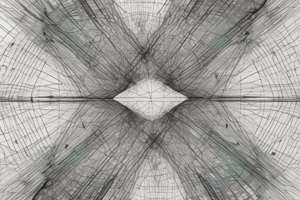Podcast
Questions and Answers
Which category of matrix transformations involves rotating a vector around a fixed point by a specific angle?
Which category of matrix transformations involves rotating a vector around a fixed point by a specific angle?
- Scaling
- Shearing
- Rotations (correct)
- Reflections
What type of matrix transformation reflects a vector across a line or plane?
What type of matrix transformation reflects a vector across a line or plane?
- Scaling
- Reflections (correct)
- Combinations
- Shearing
Which matrix transformation involves scaling a vector uniformly or non-uniformly along each coordinate axis?
Which matrix transformation involves scaling a vector uniformly or non-uniformly along each coordinate axis?
- Scaling (correct)
- Shearing
- Combinations
- Rotations
What does a shearing matrix transformation cause a vector to do along a particular axis?
What does a shearing matrix transformation cause a vector to do along a particular axis?
In the context of matrix transformations, what does the notation T(v) = Av represent?
In the context of matrix transformations, what does the notation T(v) = Av represent?
Which category of matrix transformations involves a combination of rotation, reflection, scaling, and shearing?
Which category of matrix transformations involves a combination of rotation, reflection, scaling, and shearing?
What type of transformation does the rotation matrix represent?
What type of transformation does the rotation matrix represent?
Which matrix represents reflection across the x-axis?
Which matrix represents reflection across the x-axis?
What is the purpose of a shearing matrix?
What is the purpose of a shearing matrix?
In matrix transformations, what does invertible mean?
In matrix transformations, what does invertible mean?
How are two transformations applied in succession represented in matrix transformations?
How are two transformations applied in succession represented in matrix transformations?
Which field benefits from matrix transformations in controlling and moving robots?
Which field benefits from matrix transformations in controlling and moving robots?
Flashcards are hidden until you start studying
Study Notes
Exploring Matrix Transformations
Matrices are fundamental tools in the world of mathematics, enabling us to represent and manipulate linear relationships between vectors. In this article, we'll be diving into the fascinating world of matrix transformations, a remarkable application of matrices.
Matrices as Transformations
A matrix serves as a tool to describe a linear transformation between two vector spaces. When we apply a matrix to a vector, we transform the vector according to a specific rule or pattern defined by the matrix.
A transformation can be represented as (T(\mathbf{v})), where (T) is the transformation and (\mathbf{v}) is a vector. When we use matrices to represent transformations, we write (T(\mathbf{v}) = A\mathbf{v}), where (A) is the matrix.
Types of Matrix Transformations
Matrix transformations fall into the following categories:
- Rotations: A matrix that rotates a vector around a fixed point by a specific angle.
- Reflections: A matrix that reflects a vector across a line or plane.
- Scaling: A matrix that scales a vector uniformly or non-uniformly along each coordinate axis.
- Shearing: A matrix that causes a vector to be skewed or sheared along a particular axis.
- Combinations: A combination of two or more transformations like rotation, reflection, scaling, and shearing.
Examples of Matrix Transformations
Let's examine some simple examples of matrix transformations.
Rotation: A matrix that rotates a vector counterclockwise by an angle (\theta) around the origin in 2D is:
[ \begin{bmatrix} \cos\theta & -\sin\theta \ \sin\theta & \cos\theta \end{bmatrix} ]
Reflection: A reflection matrix is:
[ \begin{bmatrix} 1 & 0 \ 0 & -1 \end{bmatrix} ]
for reflection across the (y)-axis, and:
[ \begin{bmatrix} -1 & 0 \ 0 & 1 \end{bmatrix} ]
for reflection across the (x)-axis.
Scaling: A uniform scaling matrix is:
[ \begin{bmatrix} s_x & 0 \ 0 & s_y \end{bmatrix} ]
for scaling in the (x) and (y) directions by factors (s_x) and (s_y).
Shearing: A shearing matrix is:
[ \begin{bmatrix} 1 & \alpha \ \beta & 1 \end{bmatrix} ]
for a shear along the (x)-axis by (\alpha) and along the (y)-axis by (\beta).
Properties of Matrix Transformations
- Invertible: If a matrix represents a transformation, its inverse is a matrix representing the inverse transformation.
- Composition: Applying two transformations in succession is equivalent to applying a single transformation defined by the product of the matrices representing the two individual transformations.
Applications of Matrix Transformations
Matrix transformations are not only fascinating to study but also extremely valuable in real-world applications:
- Computer Graphics: Matrix transformations are used to draw images, objects, and scenes in a variety of computer graphics applications.
- Image Processing: Matrix transformations are used to manipulate and transform images in different ways.
- Robotics: Matrix transformations facilitate the control and movement of robots.
- Engineering: Matrix transformations are used in various areas of engineering, including civil engineering and structural analysis.
In conclusion, matrix transformations are a powerful tool for representing and manipulating linear transformations in mathematics. The beauty of these transformations lies in their ability to capture the essence of geometric transformations using matrices, making them a cornerstone of modern mathematics and its applications in computer science, engineering, and many other fields.
Studying That Suits You
Use AI to generate personalized quizzes and flashcards to suit your learning preferences.





